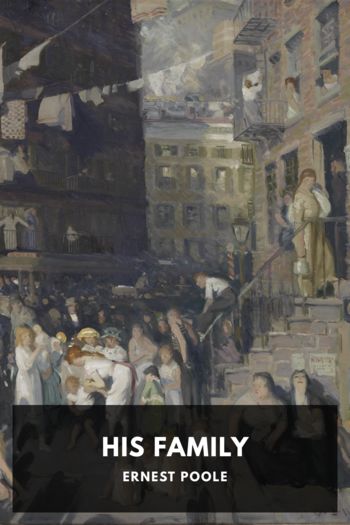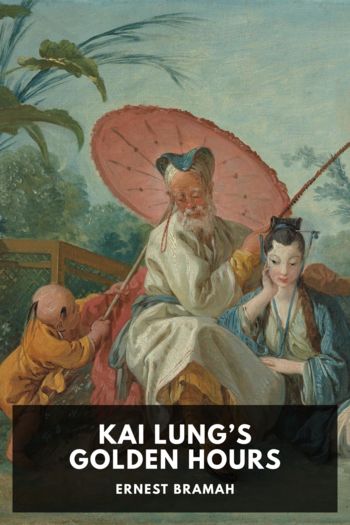His Family - Ernest Poole (ereader for comics .txt) 📗

- Author: Ernest Poole
Book online «His Family - Ernest Poole (ereader for comics .txt) 📗». Author Ernest Poole
“I am and I’m glad of it. Edith and the kiddies suit me right down to the ground. I’m crazy about ’em—you know that. But a chap with a job like mine,” Bruce continued pleadingly, as he drove his car rushing around a curve, “needs a little dissipation, too. I can’t tell you what it means to me, when I’m kept late at the office, to have this car for the run up home. Lower Broadway’s empty then, and I know the cops. I swing around through Washington Square, and the Avenue looks clear for miles, nothing but two long rows of lights to the big hump at Murray Hill. It’s the time between crowds—say about ten. And I know the cops.”
“That’s all right,” said Roger. “No one was more delighted than I when you got this car. You deserve it. It’s the work that I was speaking of. You’ve got it going at such a speed—”
“Only way on earth to get on—to get what I want for my family—”
“Yes, yes, I know,” muttered Roger vaguely. Bruce began talking of his work for the steel construction concern downtown.
“Take it from me,” he declared at the end, “this town has only just begun!”
“Has, eh,” Roger grunted. “Aren’t the buildings high enough?”
“My God, I wish they were twenty times higher,” Bruce rejoined good-humoredly. “But they won’t be—we’ve stopped going up. We’ve done pretty well in the air, and now we’re going underground. And when we get through, this old rock of Manhattan will be such a network of tunnels there’ll be a hole waiting at every corner to take you wherever you want to go. Speed? We don’t even know what it means!”
And again Bruce “let her out” a bit. It was quite a bit. Roger grabbed his hat with one hand and the side of the car with the other.
“They’ll look back on a mile a minute,” said Bruce, “as we look back on stage coach days! And in the rush hour there’ll be a rush that’ll make you think of pneumatic tubes! Not a sound nor a quiver—just pure speed! Shooting people home at night at a couple of hundred miles an hour! The city will be as big as that! And there won’t be any accidents and there won’t be any smoke. Instead of coal they’ll use the sun! And, my God, man, the boulevards—and parks and places for the kids! The way they’ll use the River—and the ocean and the Sound! The Catskills will be Central Park! Sounds funny, don’t it—but it’s true. I’ve studied it out from A to Z. This town is choking itself to death simply because we’re so damn slow! We don’t know how to spread ourselves! All this city needs is speed!”
“Bruce,” said Roger anxiously, “just go a bit easy on that gas. The fact is, it was a great mistake for me to eat those crabs tonight.”
Bruce slowed down compassionately, and soon they turned and started home. And as they drew near the glow of the town, other streets and boulevards poured more motors into the line, until at last they were rushing along amid a perfect bedlam made up of honks and shrieks of horns. The air grew hot and acrid, and looking back through the bluish haze of smoke and dust behind him Roger could see hundreds of huge angry motor eyes. Crowding and jamming closer, pell mell, at a pace which barely slackened, they sped on, a wild uproarious crew, and swept into the city.
Roger barely slept that night. He felt the city clamoring down into his very soul. “Speed!” he muttered viciously. “Speed—speed! We need more speed!” The words beat in like a savage refrain. At last with a sigh of impatience he got up in his nightshirt and walked about. It was good to feel his way in the dark in this cool silent house which he knew so well. Soon his nerves felt quieter. He went back to his bed and lay there inert. How good it would be to get up to the farm.
The next Saturday evening, with Deborah, he started for the mountains. And Bruce came down to see them off.
“Remember, son,” said Roger, as the two walked on the platform. “Come up this year for a month, my boy. You need it.” The train was about to start.
“Oh, I’ll be all right,” was the answer. “My friend the Judge, who has hay fever, tells me he has found a cure.”
“Damn his cure! You come to us!”
“Hold on a minute, live and learn. The Judge is quite excited about it. You drink little bugs, he says, a billion after every meal. They come in tall blue bottles. We’re going to dine together next week and drink ’em till we’re all lit up. Oh, we’re going to have a hell of a time. His wife left town on Tuesday.”
“Bruce,” said Roger sternly, as the train began to move, “leave bugs alone and come up and breathe! And quit smoking so many cigarettes!” He stepped on the car.
“Remember, son, a solid month!” Bruce nodded as the train moved out.
“Good luck—goodbye—fine summer—my love to the wife and the kiddies—” and Bruce’s dark, tense, smiling face was left behind. Roger went back into the smoker.
“Now for the mountains,” he thought. “Thank God!”
XIVA few hours later Roger awakened. His lower berth was still pitch dark. The train had stopped, and he had been roused by a voice outside his window. Rough and slow and nasal, the leisurely drawl of a mountaineer, it came like balm to Roger’s ears. He raised the curtain and looked out. A train hand with a lantern was listening to a dairy man, a tall young giant in top boots. High overhead loomed a shadowy mountain and over its rim came the glow of the





Comments (0)